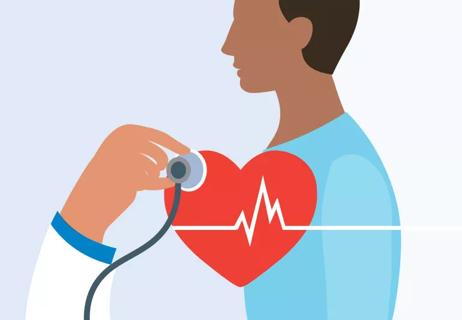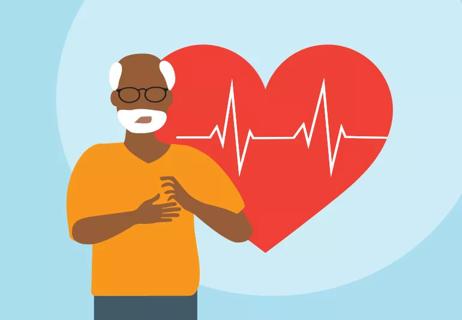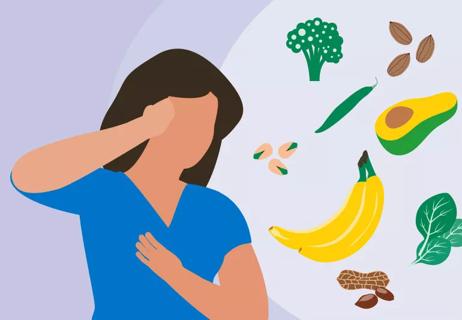Chronic stress can trigger palpitations, inflammation, angina and other serious heart issues

Chronic stress can trigger heart problems like chest pain and inflammation. And that probably doesn’t come as a surprise. From traffic jams to job interviews, you’ve likely been in more than one situation that made you feel like your heart was about to leap out of your chest.
Advertisement
Cleveland Clinic is a non-profit academic medical center. Advertising on our site helps support our mission. We do not endorse non-Cleveland Clinic products or services. Policy
Cardiologists Dennis Bruemmer, MD, and Luke Laffin, MD, explain the relationship between stress and heart disease.
Chronic stress (ongoing, long-lasting stress) has the potential to cause cardiovascular disease — both directly and indirectly. For many people, chronic stress:
Chronic stress produces hormonal changes that, over time, can impact the structure and function of your cardiovascular system, causing (or worsening) heart disease.
Of course, stress is a normal and expected part of daily life. A little stress can even be good for you. That’s because your body is designed to handle challenging situations when they arise.
Advertisement
“Stress sparks your ‘fight-or-flight’ response, flooding your body with hormones like adrenaline and cortisol,” Dr. Bruemmer explains. “Your body focuses on doing what it has to do to survive in the moment and slows down other processes, like digestion, to free up more energy.”
Stress starts to have a negative impact on your body when it doesn’t let up.
“When stress is constant, your body remains in alert mode,” Dr. Laffin adds. “And perpetually high levels of stress hormones can trigger physiological changes, including changes to your heart.”
Stress has the potential to:
If you occasionally experience the following symptoms of chronic stress, Dr. Laffin recommends seeing your primary care provider or cardiologist to rule out a heart condition:
(If you’re experiencing all of these symptoms all at once, call emergency services. These could be signs of a medical emergency.)
Finding out that the stress in your life is negatively impacting your heart is, in a word, stressful. But there’s good news: Learning how to better manage your stress won’t just make you feel better — but it could improve your cardiovascular health, too!
“We can all relate to being burnt out, depleted and stressed,” Dr. Bruemmer empathizes. “But it doesn’t mean we can’t do anything about it.”
There are many different mindfulness techniques — like meditation or breathwork — that you can use to better manage stress and prevent cardiovascular disease. These techniques are most effective when they’re paired with other good health behaviors, he explains.
“Getting enough sleep, eating right, exercising and maintaining an active social life makes us feel better equipped to handle stressful situations,” says Dr. Bruemmer. “Depending on your circumstances, you may benefit from working with a therapist or attending a support group, too.”
Whatever stress management techniques you choose, you’ll need to practice them regularly.
“Stress management needs to become part of your daily routine, like bathing, brushing your teeth and taking your medication,” advises Dr. Laffin. “But the time you invest is worth it. Learning proper coping skills means that — when the next big stressor happens — it will be less likely to take a toll on your health.”
Advertisement

Sign up for our Health Essentials emails for expert guidance on nutrition, fitness, sleep, skin care and more.
Learn more about our editorial process.
Advertisement

Eating heart-healthy foods, moving around more and getting quality sleep are a few ways to get started

If you don’t have other symptoms, try using relaxation techniques and vagal maneuvers to calm your heart down

Yes — and depending on the level of dehydration, you may need emergency care

Research shows a strong association between rheumatoid arthritis and heart issues

Knowing what you can do to prevent or manage heart disease is half the battle

A skipped heartbeat is usually your heart returning to its normal electrical path

Don’t self-medicate with vitamin supplements without consulting a doctor first

Too little magnesium can make your heartbeat go off beat

Even small moments of time outdoors can help reduce stress, boost mood and restore a sense of calm

A correct prescription helps your eyes see clearly — but as natural changes occur, you may need stronger or different eyeglasses

Both are medical emergencies, but they are very distinct events with different causes